Standard Bank Group Bundle
Can Standard Bank Group Continue Its Ascent in the African Banking Industry?
Standard Bank Group, a cornerstone of the African financial landscape, has consistently demonstrated the critical importance of a robust Standard Bank Group SWOT Analysis and growth strategy within the dynamic financial services sector. The 2022 acquisition of Liberty Holdings marked a pivotal shift, integrating the insurer to create new ecosystems and enhance client experiences. With a rich history dating back to 1862, Standard Bank Group has evolved into Africa's largest financial services provider, making it a key player to watch.
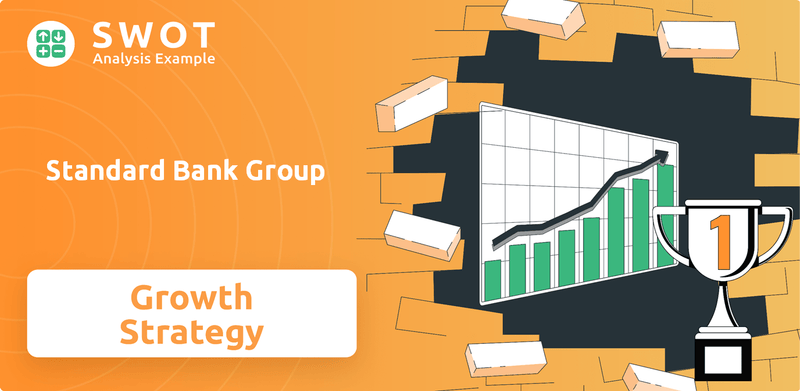
This exploration delves into the Standard Bank Group growth strategy, examining its future prospects through strategic planning, innovation, and financial performance. We will analyze how Standard Bank Group plans to navigate the challenges and opportunities within the banking industry, focusing on its expansion initiatives, digital transformation, and commitment to driving Africa's growth. Understanding the Standard Bank Group's future outlook is crucial for investors, strategists, and anyone interested in the evolving financial landscape of Africa.
How Is Standard Bank Group Expanding Its Reach?
The expansion initiatives of Standard Bank Group are primarily focused on strengthening its presence across Africa and diversifying its revenue streams. This strategy leverages its extensive footprint in 20 sub-Saharan African countries. The Africa Regions portfolio significantly contributes to the group's earnings, demonstrating the importance of its African operations in its overall growth strategy.
A key aspect of Standard Bank Group's expansion involves strategic acquisitions and integrations to enhance its service offerings. The acquisition of the remaining minority shares in Liberty Holdings in 2022 is a prime example. This move aimed to integrate the insurer more closely, allowing the group to scale its insurance and asset management businesses, providing more integrated services to its customers.
Looking at the Target Market of Standard Bank Group, the bank is committed to leading Africa's energy and infrastructure development. This commitment is supported by ambitious sustainable finance targets. The bank aims to mobilize over R450 billion by 2028 for energy and infrastructure development on the continent. This initiative builds on the R177 billion financed since 2022, with R74.3 billion mobilized in 2024 alone, aligning with its purpose of driving Africa's growth and supporting the decarbonization of African economies.
In 2024, the Africa Regions portfolio delivered R18 billion in earnings. This strong performance highlights the significance of the African market to the group's financial success. The Africa Regions portfolio also achieved an ROE of over 28%, contributing just over 40% to the group's headline earnings.
Key contributors to the Africa Regions' success include Angola, Ghana, Kenya, Mauritius, Mozambique, Nigeria, Uganda, and Zambia. These countries represent significant growth opportunities for Standard Bank Group. The diversified contributions from these nations underscore the broad-based nature of the group's African strategy.
Standard Bank Group has set a new sustainable finance target to mobilize more than R450 billion by 2028 for energy and infrastructure development on the continent. This commitment is a key component of its long-term growth strategy. The bank's focus on sustainable finance reflects its commitment to driving Africa's growth and supporting the decarbonization of African economies.
- Mobilizing R177 billion since 2022.
- R74.3 billion mobilized in 2024 alone.
- Focus on leading Africa's energy and infrastructure development.
- Supporting the decarbonization of African economies.
Standard Bank Group SWOT Analysis
- Complete SWOT Breakdown
- Fully Customizable
- Editable in Excel & Word
- Professional Formatting
- Investor-Ready Format
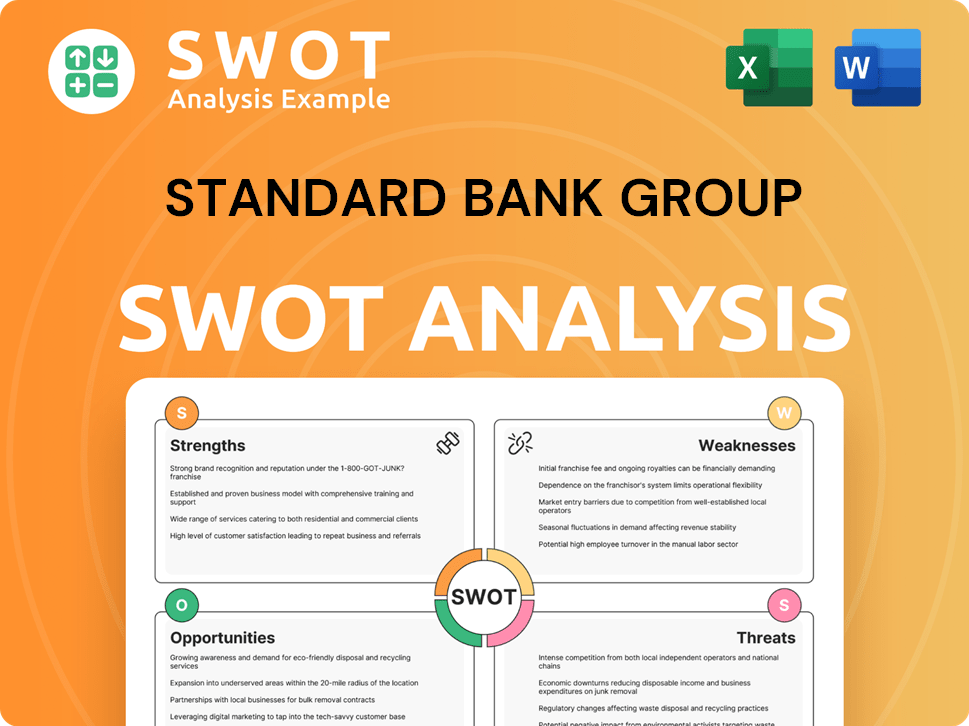
How Does Standard Bank Group Invest in Innovation?
The innovation and technology strategy of Standard Bank Group is a key driver of its growth strategy and future prospects. The bank is heavily investing in digital transformation to enhance client experiences and streamline operations within the financial services sector. This focus is crucial for maintaining a competitive edge in the banking industry.
Standard Bank Group's strategic planning includes significant investments in technology, particularly in software and cloud services. This shift from traditional hardware-focused spending to more agile and scalable solutions is designed to improve efficiency and support long-term growth. The bank's digital initiatives are also designed to meet evolving customer needs and preferences.
The bank's commitment to innovation is evident in its substantial technology spending, which increased by 2% in 2024, reaching R22.4 billion. A significant portion of this, R12.7 billion, was allocated to software, cloud services, and general technology-related costs. This investment showcases the bank's dedication to modernizing its infrastructure and providing cutting-edge services.
Standard Bank Group's digital transformation efforts have significantly increased the number of digitally active clients. This shift is crucial for improving accessibility and streamlining services within the financial services sector. The bank's focus on digital platforms is a key part of its strategic planning.
The bank's mobile app sees over 130 million logins per month from retail clients, highlighting the importance of digital channels. Digital revenue from retail clients in South Africa grew by 36% in 2024, demonstrating the success of these initiatives. This growth is a key indicator of the bank's future prospects.
By focusing on digital platforms, Standard Bank Group has streamlined its services and improved accessibility for its clients. This has enabled 90% of all business segment transactions in South Africa to be digital. This efficiency is a key part of Standard Bank Group's growth strategy.
Standard Bank Group has partnered with major cloud service providers like Amazon Web Services (AWS) and Microsoft Azure. These collaborations aim to accelerate innovation and provide flexible resources. These partnerships are crucial for maintaining a competitive advantage.
The bank invests in talent development through initiatives like the annual UniHack event. This event aims to develop IT skills and identify future talent. This commitment is essential for long-term success.
Investments in core banking systems, modernizing client platforms, and AI-enabled contact centers contribute to the bank's growth objectives. These improvements are designed to provide best-in-class client platforms. This is important for the bank's overall strategic goals.
The bank's digital transformation efforts have led to significant improvements in client engagement and operational efficiency. These initiatives are designed to meet evolving customer needs and preferences. For more details on the financial aspects of the company, you can read about the Owners & Shareholders of Standard Bank Group.
- 6% increase in digitally active retail clients in South Africa.
- 64% of retail transactional clients and 84% of business transactional clients are now digitally active.
- Mobile app sees over 130 million logins per month from retail clients.
- Digital revenue from retail clients in South Africa grew by 36% in 2024.
- 90% of all business segment transactions in South Africa are digital.
Standard Bank Group PESTLE Analysis
- Covers All 6 PESTLE Categories
- No Research Needed – Save Hours of Work
- Built by Experts, Trusted by Consultants
- Instant Download, Ready to Use
- 100% Editable, Fully Customizable
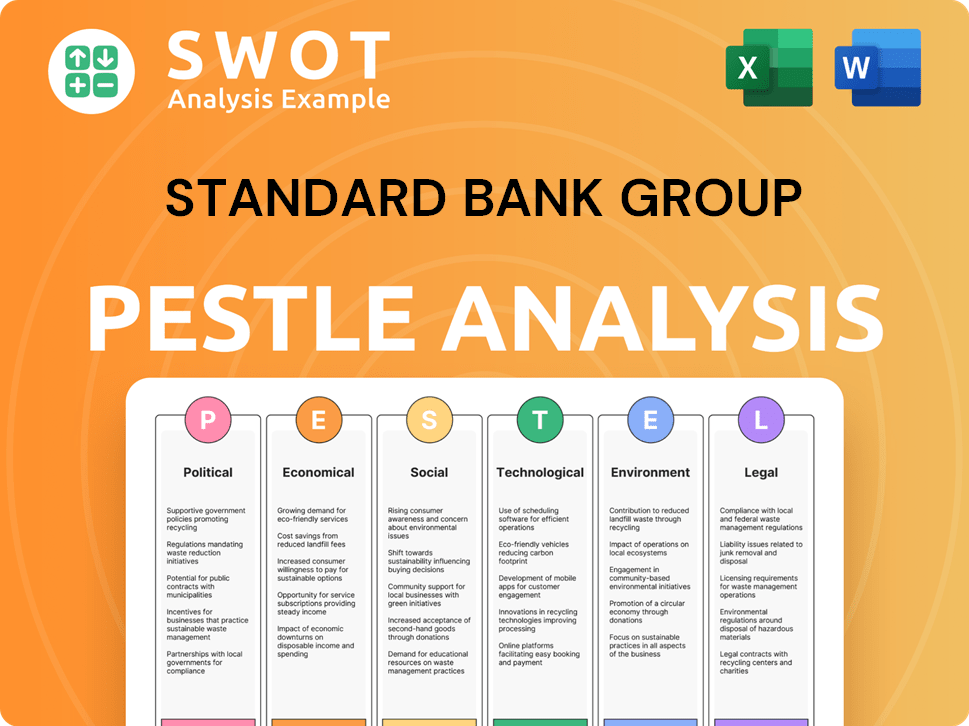
What Is Standard Bank Group’s Growth Forecast?
The financial outlook for Standard Bank Group remains positive, with the group maintaining its 2025 financial guidance despite global economic uncertainties. This positive outlook is supported by the group's strategic planning and its strong presence in key African markets. The focus on sustainable growth and digital transformation further strengthens its position in the banking industry.
For the year ended December 31, 2024, Standard Bank reported headline earnings of R45 billion and a return on equity (ROE) of 18.5%. Headline earnings per share (HEPS) increased by 4% to 2,691 cents, and the total dividend for the year was 1,507 cents, up 6%. The tangible net asset value per share rose by 8% to 15,593 cents, and the cost-to-income ratio improved to 50.5%. These figures reflect the company's solid financial performance and its ability to navigate economic challenges.
The group's diversified portfolio, with over 20 million customers across multiple African markets, provides a buffer against localized shocks. The Africa Regions portfolio delivered strong earnings of R18 billion in 2024, contributing over 40% to group headline earnings. This strong performance in Africa is a key driver of the group's overall growth strategy. To understand the revenue streams and business model that support these results, consider exploring the Revenue Streams & Business Model of Standard Bank Group.
Standard Bank is on track to meet its 2025 targets. These include banking revenue growth in the mid-to-high single digits in ZAR and a marginally declining cost-to-income ratio. The group aims for an ROE anchored between 17% and 20%.
The group has set new medium-term targets for 2026-2028, aiming for headline earnings per share growth of 8% to 12% and an ROE target range of 18% to 22%. This demonstrates a commitment to long-term growth strategy.
The group anticipates an improvement in South African real GDP growth to 1.7% in 2025 and above 2.0% in 2026. Moderating economic headwinds and more stable currencies in other sub-Saharan African countries are also expected.
Standard Bank's strong capital base, with ordinary shareholders' equity at R244.640 billion as of March 31, 2025, supports its ambitious financial targets. This financial strength provides a solid foundation for future prospects.
Standard Bank Group Business Model Canvas
- Complete 9-Block Business Model Canvas
- Effortlessly Communicate Your Business Strategy
- Investor-Ready BMC Format
- 100% Editable and Customizable
- Clear and Structured Layout
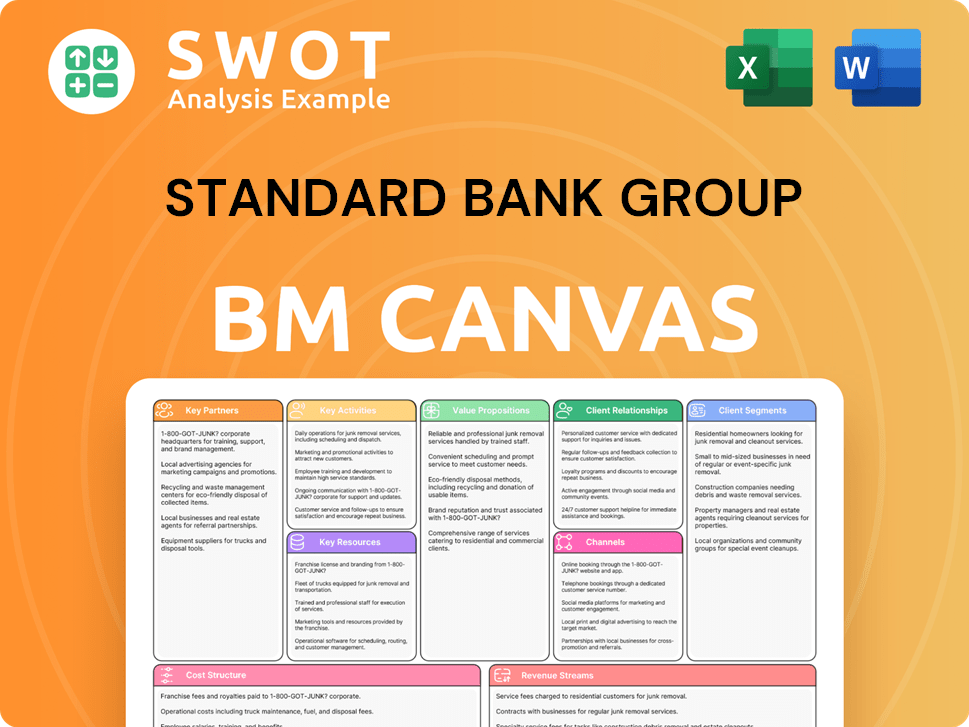
What Risks Could Slow Standard Bank Group’s Growth?
The Standard Bank Group faces several potential risks and obstacles that could influence its growth strategy and future performance. These challenges range from market competition to economic and geopolitical uncertainties, requiring the bank to maintain a proactive and adaptable approach. Understanding these risks is crucial for assessing the long-term viability of the Standard Bank Group's strategic plans.
Competition within the South African banking industry remains intense, necessitating continuous innovation and efficiency improvements. Regulatory changes, both domestic and international, also present a significant challenge, demanding constant adaptation and compliance efforts. Furthermore, technological advancements, particularly in areas like artificial intelligence and cloud computing, require substantial investment to avoid falling behind competitors.
Economic headwinds across sub-Saharan Africa, including inflation and currency volatility, pose ongoing challenges. The bank's operations are also exposed to geopolitical risks and potential trade disruptions. For example, while South African real GDP growth is projected to reach 1.7% in 2025, some regions may experience economic downturns, impacting the bank's performance.
The Standard Bank Group operates in a highly competitive market, particularly in South Africa. Competition from both domestic and international banks puts pressure on margins and market share. This necessitates continuous innovation in financial products and services to attract and retain customers. Constant adaptation to evolving customer needs and technological advancements is also crucial for maintaining a competitive edge within the financial services sector.
Regulatory changes, both locally and internationally, present a significant risk. Banks must adhere to evolving compliance requirements, including those related to anti-money laundering, data protection, and capital adequacy. Compliance failures can lead to significant penalties and reputational damage. Staying ahead of these regulatory shifts requires substantial investment in compliance infrastructure and expertise to ensure continuous adherence.
Economic volatility across sub-Saharan Africa, including inflation, interest rate fluctuations, and currency volatility, presents ongoing challenges for the Standard Bank Group. Economic downturns in key markets can negatively impact loan portfolios and profitability. The bank must actively manage its exposure to these risks through diversified operations and robust risk management practices. The banking industry is directly affected by these broader economic conditions.
Rapid advancements in financial technology (FinTech), including AI, cloud computing, and blockchain, pose a significant threat. Standard Bank Group must continuously invest in digital transformation to remain competitive. Failure to adapt to new technologies can lead to loss of market share and operational inefficiencies. The bank's ability to embrace innovation is crucial for its future prospects.
To mitigate these risks, the Standard Bank Group employs a comprehensive enterprise-wide risk management framework. This framework includes identifying and assessing risks, implementing appropriate controls, and balancing risk and return in business decisions. The group's diversified portfolio and extensive African footprint help to mitigate localized shocks. For example, the bank's credit loss ratio improved to 83 basis points in 2024, demonstrating its resilience in navigating challenging credit markets.
The bank's commitment to sustainable finance, with a target to mobilize over R450 billion by 2028, also reflects its proactive approach to managing environmental and social risks, which are integrated into its risk management framework. This commitment aligns with broader strategic planning goals.
Standard Bank Group Porter's Five Forces Analysis
- Covers All 5 Competitive Forces in Detail
- Structured for Consultants, Students, and Founders
- 100% Editable in Microsoft Word & Excel
- Instant Digital Download – Use Immediately
- Compatible with Mac & PC – Fully Unlocked
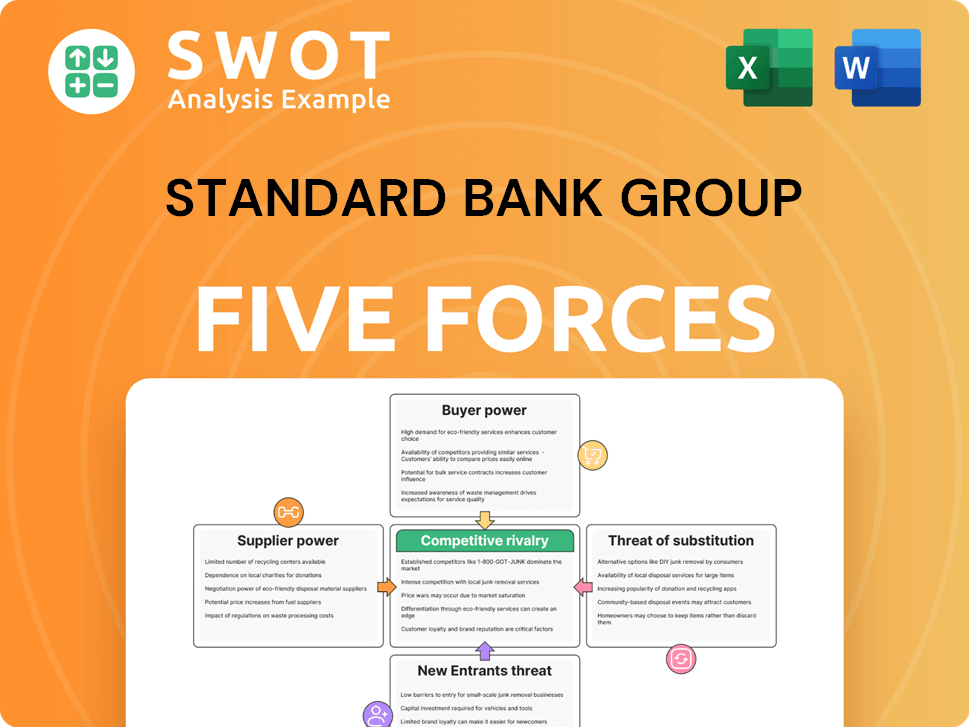
Related Blogs
- What are Mission Vision & Core Values of Standard Bank Group Company?
- What is Competitive Landscape of Standard Bank Group Company?
- How Does Standard Bank Group Company Work?
- What is Sales and Marketing Strategy of Standard Bank Group Company?
- What is Brief History of Standard Bank Group Company?
- Who Owns Standard Bank Group Company?
- What is Customer Demographics and Target Market of Standard Bank Group Company?
Disclaimer
All information, articles, and product details provided on this website are for general informational and educational purposes only. We do not claim any ownership over, nor do we intend to infringe upon, any trademarks, copyrights, logos, brand names, or other intellectual property mentioned or depicted on this site. Such intellectual property remains the property of its respective owners, and any references here are made solely for identification or informational purposes, without implying any affiliation, endorsement, or partnership.
We make no representations or warranties, express or implied, regarding the accuracy, completeness, or suitability of any content or products presented. Nothing on this website should be construed as legal, tax, investment, financial, medical, or other professional advice. In addition, no part of this site—including articles or product references—constitutes a solicitation, recommendation, endorsement, advertisement, or offer to buy or sell any securities, franchises, or other financial instruments, particularly in jurisdictions where such activity would be unlawful.
All content is of a general nature and may not address the specific circumstances of any individual or entity. It is not a substitute for professional advice or services. Any actions you take based on the information provided here are strictly at your own risk. You accept full responsibility for any decisions or outcomes arising from your use of this website and agree to release us from any liability in connection with your use of, or reliance upon, the content or products found herein.